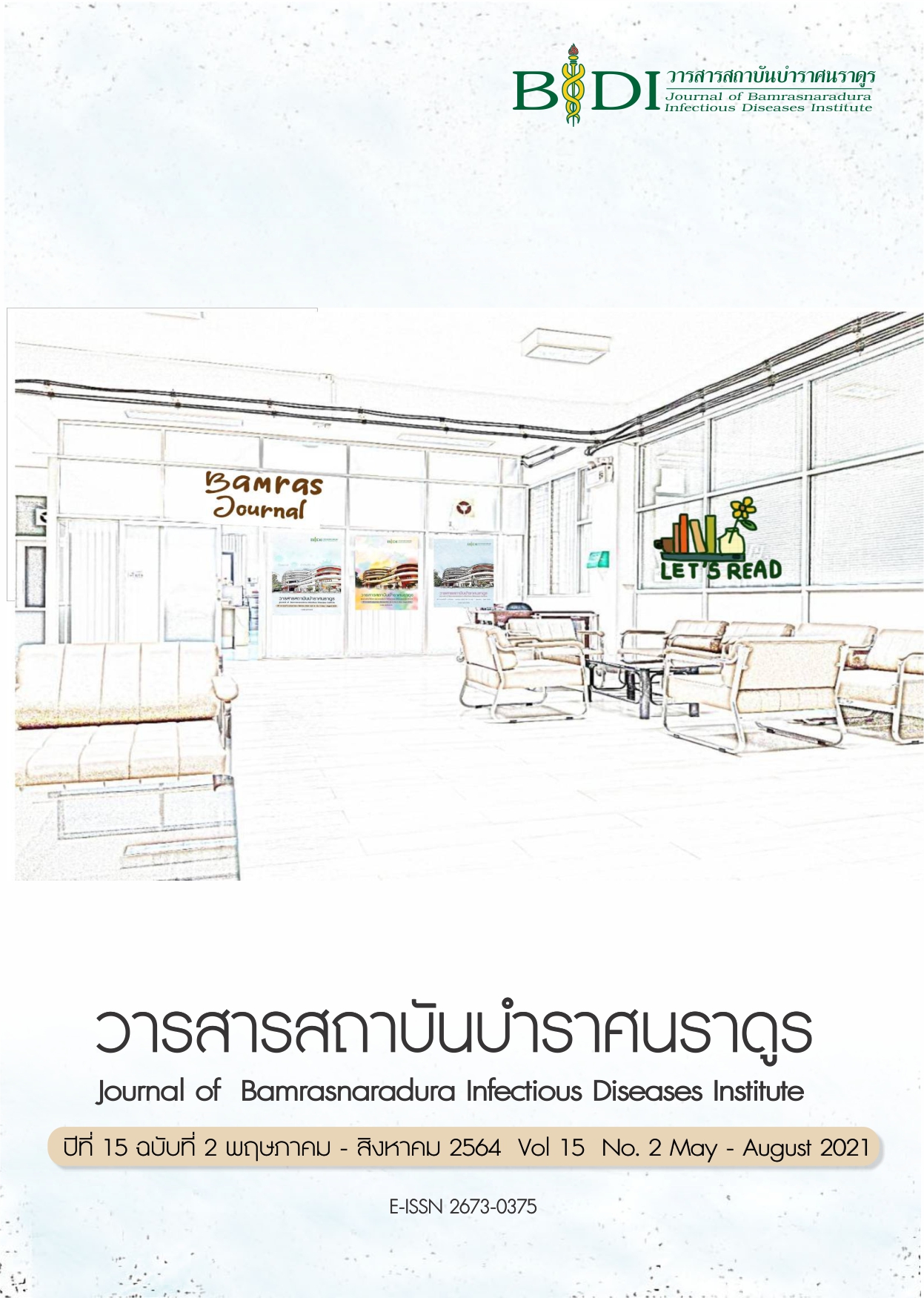ผลของโปรแกรมการชี้แนะมารดาต่อพฤติกรรมของมารดาในการดูแลเด็กโรคปอดอักเสบ
Main Article Content
บทคัดย่อ
โรคปอดอักเสบเป็นสาเหตุของการเจ็บป่วย และเสียชีวิตในเด็กอายุต่ำกว่า 5 ปี การชี้แนะมารดา เพื่อให้มีพฤติกรรมการดูแลเด็กโรคปอดอักเสบที่ถูกต้องเหมาะสมจึงเป็นสิ่งสำคัญ การวิจัยครั้งนี้เป็นการวิจัยกึ่งทดลองแบบสองกลุ่มวัดผลก่อน และหลังการทดลอง มีวัตถุประสงค์เพื่อศึกษาผลของโปรแกรมการชี้แนะมารดาต่อพฤติกรรมของมารดาในการดูแลเด็กโรคปอดอักเสบ กลุ่มตัวอย่าง คือ มารดาของเด็กอายุต่ำกว่า 5 ปี ที่ป่วยด้วยโรคปอดอักเสบครั้งแรก และเข้ารับการรักษาในโรงพยาบาพระนครศรีอยุธยา จังหวัดพระนครศรีอยุธยา จำนวน 44 ราย คัดเลือกตามคุณสมบัติที่กำหนด แบ่งเป็นกลุ่มทดลอง และกลุ่มควบคุม กลุ่มละ 22 ราย กลุ่มทดลองจะได้รับโปรแกรมการชี้แนะมารดาเด็กโรคปอดอักเสบ ซึ่งประกอบด้วย 5 ขั้นตอน คือ 1) การตกลงร่วมกัน 2) การประเมิน และวิเคราะห์ปัญหา 3) การสะท้อนปัญหา และการวางแผนปฏิบัติ 4) การปฏิบัติตามแผนกิจกรรม และ 5) การประเมินผลการปฏิบัติ กลุ่มควบคุมจะได้รับการพยาบาลตามปกติ เครื่องมือที่ใช้ในการเก็บรวบรวมข้อมูล ได้แก่ แบบสอบถามพฤติกรรมของมารดาในการดูแลเด็กโรคปอดอักเสบ มีค่าความเชื่อมั่นสัมประสิทธิ์แอลฟาครอนบาคทั้งฉบับ เท่ากับ .85 วิเคราะห์ข้อมูลโดยใช้สถิติพรรณนา Independent t-test และสถิติ Paired t-test
ผลการวิจัย พบว่า ภายหลังได้รับโปรแกรมการชี้แนะ มารดากลุ่มทดลองมีคะแนนเฉลี่ยพฤติกรรมการดูแลเด็กโรคปอดอักเสบสูงกว่ากลุ่มควบคุมอย่างมีนัยสำคัญทางสถิติ (p = < 0.001) และสูงกว่าก่อนได้รับโปรแกรมการชี้แนะอย่างมีนัยสำคัญทางสถิติ (p < 0.001)
ผลการวิจัยครั้งนี้ แสดงให้เห็นว่าพยาบาลสามารถนำโปรแกรมการชี้แนะไปประยุกต์ใช้
เพื่อส่งเสริมให้มารดามีความรู้ ความสามารถ และมีพฤติกรรมการดูแลเด็กโรคปอดอักเสบที่ถูกต้องเหมาะสม
Article Details
เอกสารอ้างอิง
World Health Organization. End preventable Child Deaths from Pneumonia
and Diarrhea by 2025. The integrated Global Action Plan for Pneumonia and Diarrhea.
Geneva: WHO; 2013.
Medical Records & Statistics Phra Nakhon Si Ayutthaya Hospital. Hospital Patient Statistics Report Phra Nakhon Si Ayutthaya in 2017. Medical Records Audit Phra Nakhon Si Ayutthaya Hospital; 2017. (in Thai).
Siriboonpipatana P. Nursing children 2. 2nd ed. Bangkok: Tanapress; 2012. (in Thai).
Department of Disease Control, Ministry of Public Health. Guidelines for preventing contact disease in the center young children (for teachers and childcare). 2nd ed.
Nonthaburi: General Contact Bureau Department of Disease Control, Ministry of Public Health; 2011. (in Thai).
Wilson D. The child with respiratory dysfunction. In Hockenberry M J, Wilson D, editors. Essentials pediatric nursing. St. Louis: Mosby; 2009.
Balyore A, Lertsuphotvanit S, Sareebutara W. The Knowledge and Behavior on Prevention of Acute Respiratory Infection (ARIs) in Children. Health Science j 2007; 16(4): 597-605.
(in Thai).
Sakunkhoo R. Incidence and risk factors for recurrent pneumonia among children. Buddhachinaraj medical j 2014; 31(1): 46-53. (in Thai).
Threesoon P. The effects of maternal coaching program on caring behaviors for toddler with pneumonia [dissertation]. Bangkok: Chulalongkorn University; 2011. (in Thai).
Suwanwaiphatthana W. Challenging: The role of the nurse in the prevention of recurrent pneumonia in children. The Journal of Baromarajonani College of Nusing, Nakhonratchasima 2016; 22(1): 121-30. (in Thai).
Girvin J. Coaching for improving job performance and satisfaction. Nurs Times 1999 Dec 29; 95(50): 55-7. PMID: 11107424.
Chaiya S. Situation of Pneumonia in Thailand. Weekly Epidemiological Surveillance Report 2015; 47(28): 101-03. (in Thai).
Burns N, Grove S K. The practice of nursing research: conducts, critique and utilization.
th ed. St. Louis, MO: Elsevier Saunders; 2005.
Mornthawee S. The effect of coaching program on maternal behavior to prevent breast feeding jaundice in full term neonate. [dissertation]. Bangkok: Chulalongkorn University; 2011. (in Thai).
Suksawat S. Effect of coaching on care practices among parents of childern with asthma. [dissertation]. Chaing Mai: Chaing Mai University; 2011. (in Thai).
Apichaiyawat S. Effects of coaching on care practices among parents of children with pneumonia. [dissertation]. Chaing Mai: Chaing Mai University; 2009. (in Thai).
Smith S R. Asthma coaching in the pediatric emergency department. Acad Emerg Med
Aug; 13(8): 835-9. doi: 10.1197/j.aem.2006.03.565.


